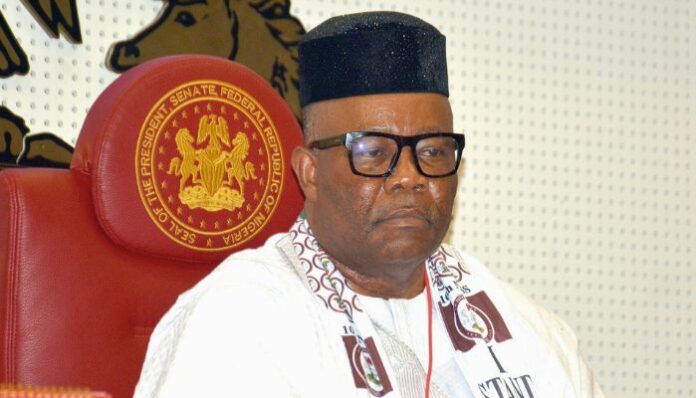Over N90 billion worth of projects was allocated exclusively within the constituency of Godswill Akpabio, the Senate President in the 2024 budget of the Federal Ministry of Agriculture and Food Security.
An analysis of the budget shows that a significant chunk of the projects are outside the mandate of the ministry.
BudgIT, a civic-tech organization warns that the allocation does not only surpasses the ministry’s capacity but also raises concerns about potential economic stagnation.
Akpabio represents the North West Senatorial District in Akwa Ibom State which covers 10 local government areas which comprise Abak, Essien, Etim Ekpo, Ika, Ikono, Ikot Ekpene, Ini, Obot, Oruk Anam and Ukanafun.
An analysis of the ministry’s budget shows that Akpabio’s district received at least 280 projects, the highest chunk of the allocation to Akwa Ibom state, but no fewer than 15 projects were allocated to other Senatorial districts
A breakdown of the Budget shows that , N7. 291 billion was allocated for the construction and equipping of Information Communication and Technology Centres ; N395 million for the Construction and equipping of Community schools; N957 million for the supply of sewing machine, hairdressing/barbing equipment, and deep freezers ; N50 million for the construction of district head palace; N4 billion for Construction of police stations.
N12.721 billion for the construction of roads within communities and supply transformers; N28.111 billion for the construction of roads within communities: N3.111 billion for the provision of farm implements, motorcycles, tricycles, welding machine to artisans, and buses
Others are N 4.538 billion for the empowerment materials and training to women and youths; and provision of grants; N474 million for the provision of security cars; N1.286 billion for the provision of educational materials to selected schools; N1.220 billion for the provision of medical supplies and equipment to health centres; N2.996 billion for starter packs for youths and women
Also included is N7. 551bn billion for the drilling and provision of solar powered boreholes and street lights; N1.095 bn for Workspace and farm stalls; N475 million for development of Agricultural value chains; N4.090 billion for construction and equipping of Primary Healthcare Centres; N4.701bn for construction of Town Halls/ equipping and construction of community centres; N1.565bn for provision, and installation of transformers; N1.2 billion for construction of intensive care unit, N1.5 billion for erosion control; N691 million for the distribution of grains to cushion the impact of hunger.
In the budget proposal, the ministry focused mainly on its core mandate , but after it was reviewed by the National Assembly, various projects were inserted.
BudgIT highlights that many of these projects fall outside the ministry’s core responsibilities and are seemingly tailored to the political interests of lawmakers rather than addressing the nation’s developmental needs.
Of particular concern is the lack of technical capacity within the ministry to efficiently execute these projects, leading to a trail of poorly executed initiatives across the country. BudgIT emphasizes that such misallocation of resources not only results in waste but also undermines the ministry’s ability to drive economic growth and enhance citizens’ welfare.







